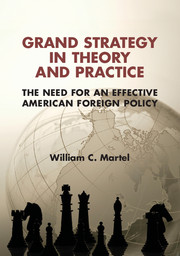Book contents
- Frontmatter
- Dedication
- Contents
- Acknowledgments
- 1 Introduction
- 2 Contemporary Classics in American Grand Strategy
- Part I Makers of Grand Strategy
- 3 Foundations of Grand Strategy
- 4 Ancient and Modern Eras of Grand Strategy
- 5 Grand Strategies of Empire in the Modern Era: Sixteenth to Twentieth Centuries
- 6 Revolutionary and Nuclear Eras of Grand Strategy
- Part II Makers of American Grand Strategy
- Part III Conclusion
- Notes
- Index
3 - Foundations of Grand Strategy
Published online by Cambridge University Press: 05 January 2015
- Frontmatter
- Dedication
- Contents
- Acknowledgments
- 1 Introduction
- 2 Contemporary Classics in American Grand Strategy
- Part I Makers of Grand Strategy
- 3 Foundations of Grand Strategy
- 4 Ancient and Modern Eras of Grand Strategy
- 5 Grand Strategies of Empire in the Modern Era: Sixteenth to Twentieth Centuries
- 6 Revolutionary and Nuclear Eras of Grand Strategy
- Part II Makers of American Grand Strategy
- Part III Conclusion
- Notes
- Index
Summary
The term grand strategy is relatively new to the lexicon of international politics and policy. To understand its meaning, it is essential to keep in mind that it is not a term that scholars of international relations and practitioners of statecraft have employed since the early origins of the literature on strategy and politics. To be sure, merely because the term did not exist in earlier times does not mean that we cannot use it retroactively to understand state policies during, for example, the Roman Empire. Edward Luttwak, in his famous study The Grand Strategy of the Roman Empire, does exactly that and achieves some fascinating, if heavily critiqued, insights into Roman political and military trends over time.
The term grand strategy, if we export it to the past, has to be handled with some degree of sensitivity to the historical context. What was the nature of the state during this time period? What were the state’s primary political purposes – e.g., security, prosperity, or justice? What was the range of the state’s capabilities? What was the nature of the international system? The challenge is that thinkers and practitioners of grand strategy have not used the term in the same way and with the same meaning consistently through time. It has evolved, changed, and altered its meaning as the purpose of the state has changed, the breadth of its capabilities have expanded or narrowed, and the essential features of the international system have shifted. The threshold for inquiry into grand strategy, then, begins with defining the term in a precise, coherent, and contextualized fashion.
- Type
- Chapter
- Information
- Grand Strategy in Theory and PracticeThe Need for an Effective American Foreign Policy, pp. 23 - 56Publisher: Cambridge University PressPrint publication year: 2015



